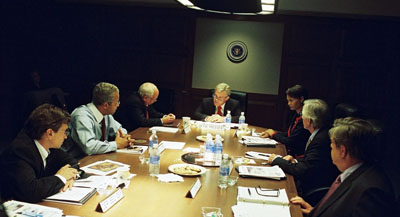|
|
Not Really An A-List:
|

|
Oddly enough, some have chosen to deal with that dilemma by switching wars. The aforementioned Clint Eastwood World War II duo, Flags of Our Fathers and Letters from Iwo Jima, are two of the most acclaimed war films of the past eight years, even if they too struggled at the box office. Herzog's Vietnam film, Rescue Dawn, was similarly praised during its mostly art house run. And we can't overlook Tropic Thunder, which made more money than every film I've mentioned. One of the only films we've seen about the first Iraq war – Sam Mendes' Jarhead – was, in my opinion, one of the strongest efforts of this struggling movement. I know very few people are with me on that film, but I thought the slow, languorous portrayal of college kids thrown into the desert to sit around and wait for something to happen was easily the most timely and moving reflection of the current situation.New at BOP: Share & Save
![]() Tweet
Tweet
![]() Print this column
Print this column
A-List Recent War Movies: Jarhead, In the Valley of Elah, Rescue Dawn
Subtle Comments Creep into Action Films
Action is a genre that can very well exist in a political vacuum. We do not need to know what the presidential picture is like to understand the concept of a Death Race. We need to know nothing about the global economic situation to understand why Jet Li and Jason Statham would like to kick one another. Yet, even seemingly unrelated action and drama films can't help but throw a bit of commentary in lately.
These moments are usually subtle, but powerful. When sneaking into the containment center in Children of Men, Clive Owen pauses to looks at subjects being interrogated in the style of Abu Ghraib. Alec Baldwin's gleeful police chief in The Departed celebrates his new observational freedom as a result of the Patriot Act. Batman engages in some light domestic surveillance, but only when it's really, really necessary – and only because he can't be the hero. These moments don't just serve as a nod or a comment – they perform the Orwellian task of grounding the film, not in the real world, but an ever-so-slight variation.
|
Advertisement |
Bush Parodies Are Everywhere
During the Clinton administration, cinematic presidents didn't have to look or act like Slick Willie. Bill Pullman was not forcing a Southern drawl in Independence Day. Morgan Freeman did not have a thing for interns and jazz in Deep Impact. It wasn't necessary at the time – ditto for the previous few administrations. Now, however, every president that turns up on the big screen has a bad haircut, a Texas accent, and a cocky swagger. This may be a statement to just how ubiquitous Bush has become – we seriously can't even think of the office of President without picturing him, for better or worse. (Okay, for worse, for much, much worse.)
This has dragged down a movie or two along the way. Get Smart suffered from an incredibly tired series of Bush-isms by James Caan. Dennis Quaid's president-turned-academic was yet one problem in the mess that was American Dreamz. Conversely, the best examples of this have been somewhat tangential: Billy Bob Thornton's excellent cocky jackass of a Commander-in-Chief in Love Actually and Sam Rockwell's unmistakably Bushian Zaphod in Hitchhiker's Guide to the Galaxy. And of course, there's Josh Brolin in W. Though, to be fair, there's something oddly Bush-like about Brolin in No Country For Old Men, as well – the Texan lone wolf in way too deep.
A-List Bush Parodies: Love Actually, Hitchhiker's Guide to the Galaxy, W.

|
|
|

|
Friday, November 1, 2024
© 2024 Box Office Prophets, a division of One Of Us, Inc.

